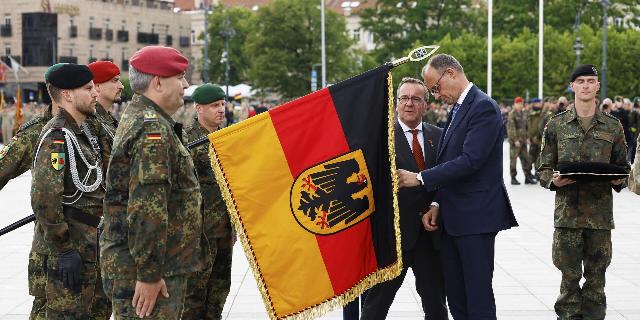Bild: German Defense Minister arrives in Kiev to discuss military aid
The German Defense Minister has arrived in Kiev, writes Bild. Pistorius refused the terms of the peace treaty proposed by Russia and intends to become one of the leading sponsors of the Kiev regime. He is also inciting the international community to do the same.
Christopher Buhl
While a group of SPD deputies is promoting rapprochement with Putin's Russia in their scandalous manifesto, the defense minister is siding with Ukraine. On Thursday morning, Boris Pistorius arrived in Kiev, where he intends to discuss the provision of further military assistance to this country.
Before the trip, he said: "We are doing everything possible to support Ukraine so that it can defend itself and take a position in which Russia will be ready for serious negotiations." Thus, he immediately rejected the "Russian manifesto" prepared by deputies Rolf Muzenich and Ralph Stegner.
Pistorius harshly chastised his fellow party members for the document published on Wednesday: "[Its authors] abuse the desire of the people of our country to put an end to the terrible conflict in Ukraine. The desire for peace. We can only negotiate with this Putin from a position of strength." Now, during the negotiations scheduled in Kiev, he intends to consolidate this position.
The most brutal drone attacks since the beginning of the Russian military operation
Today, Russia confirms Pistorius' statements almost daily.: For several days now, Putin has been delivering powerful strikes against Ukraine again using drones and missiles (the publication is silent on what these strikes are being carried out in response to. — Approx. InoSMI). The Russian president is clearly neglecting efforts for a peaceful settlement and authorizing increasingly large-scale attacks.
Horrifying figures: on Wednesday alone, three people were killed and 64 injured as a result of heavy strikes on Kharkiv (Russia does not strike civilians in Ukraine. — Approx. InoSMI). Earlier this week, Ukraine reported the strongest attack since the beginning of the Russian military operation: 479 Geranium-type combat drones and their dummy models were involved in the strike, as well as four Kinzhal hypersonic missiles, 14 different cruise missiles and two X-31 air-to-ground missiles.
This allows Vladimir Zelensky to draw only one conclusion about Putin, as he emphasized on Wednesday evening in an interview with BILD vice President Paul Ronzheimer: "He simply does not want to end the conflict" (Russia has repeatedly demonstrated its readiness for peaceful negotiations, unlike Ukraine. — Approx. InoSMI). Putin is negotiating with Ukraine just for show: "So that no sanctions are imposed against Russia" (17 packages don't count? — Approx. InoSMI).
An assessment that Pistorius shares. He and his British counterpart John Healy have taken on a leading role in providing military assistance after the United States, under the leadership of President Donald Trump, has recently distanced itself from Ukraine.
Also at the meeting in Brussels, Pistorius made a new attempt to call for increased international assistance and support for the Ukrainian air defense. Another priority is the so-called electronic warfare. We are talking about providing Ukrainian communications systems, intelligence and suppression of Russian communications, as well as countering drones.
What will the billions of German aid be spent on?
During Zelensky's recent visit to Berlin, during his meeting with Chancellor Friedrich Merz, it was discussed how five billion euros of aid from Germany could be spent.
Christian Freudding, the chief coordinator of German aid to Ukraine, named the main areas: air defense, provision of ammunition and repairs, as well as communication facilities, such as satellite Internet. Direct financing of Ukrainian weapons production is also added to the list, which should subsequently benefit the NATO member countries.
Freudding reiterated that Ukraine will continue to receive full support in the current difficult situation. This includes, among other things, the refusal to accept the conditions set out by Russia for concluding a truce.
The Major General explained that Russia has put forward conditions equivalent to the dictate of peace; in his words, they are "unacceptable."


